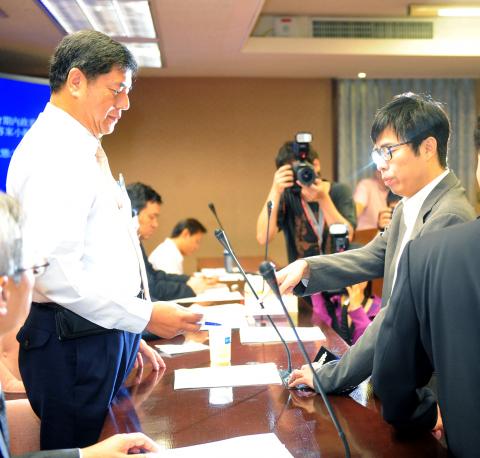Chinese Nationalist Party (KMT) Legislator Chang Ching-chung (張慶忠) yesterday triggered fresh controversy by passing a KMT proposal at a legislative committee meeting he was chairing to probe the signing of the cross-strait service trade agreement and abruptly calling the session to an end while Democratic Progressive Party (DPP) Legislator Tuan Yi-kang (段宜康) was still speaking at the podium.
Amid the ongoing disputes over the trade pact and the government’s handling of it, a commission was created under the legislature’s Internal Administration Committee to investigate the criticisms and concerns voiced about the cross-strait negotiations that led to the deal’s signing.
Since the majority of government agencies have yet to submit the documents for the probe requested by the commission, the committee last week decided to extend the submission deadline from May 31 to Aug. 31, when it will be DPP Legislator Chen Chi-mai’s (陳其邁) turn to serve as committee chair.

Photo: Wang Min-wei, Taipei Times
However, KMT legislators on the committee yesterday tabled a proposal to change the deadline back to its original date, triggering protests from their DPP counterparts, who took turns speaking at the podium to explain why they are opposed to moving the deadline back.
As Tuan was speaking, Chang suddenly asked the committee to vote on the KMT motion and quickly declared that it had passed, so the deadline was restored to May 31.
“Do you know the price you have to pay to run a tank through the committee meeting?” Tuan said in reaction to Chang’s move.
“This is too much, how could you hold a vote and declare a motion passed while a legislator is still talking on the podium?” DPP Legislator Lee Chun-yi (李俊俋) said.
Ignoring the protests, Chang called the meeting to an end and promptly left the room.
“Chang has planted a bomb in the Internal Administration Committee,” Tuan said. “We will see what happens on Wednesday [during the next meeting].”
After the meeting, DPP lawmakers condemned what they called the KMT’s “rude” behavior at a press conference.
“It’s clear that by changing the document request deadline from Aug. 31 — the date agreed upon at last week’s committee meeting — to May 31, the KMT is trying to prevent the public from knowing the truth behind the [cross-strait service trade pact] negotiations,” Chen said.
If the deadline is at the end of the month, there will not be enough time to request and collect the required documents, he added.
Chen said he would convene another committee meeting next week to again extend the document request deadline.
There is only one reason the KMT wants to move the deadline forward: To pass the supervision statute and the service trade pact in the current legislative session or an in extra session, if there is one, Lee added.
“I’d like to remind KMT legislators that the ‘black-box procedure’ [critics’ term for the bilateral trade negotiations] is what triggered the Sunflower movement. They should not have produced another black box,” Lee said.
Additional reporting by Chris Wang

MAKING WAVES: China’s maritime militia could become a nontraditional threat in war, clogging up shipping lanes to prevent US or Japanese intervention, a report said About 1,900 Chinese ships flying flags of convenience and fishing vessels that participated in China’s military exercises around Taiwan last month and in January last year have been listed for monitoring, Coast Guard Administration (CGA) Deputy Director-General Hsieh Ching-chin (謝慶欽) said yesterday. Following amendments to the Commercial Port Act (商港法) and the Law of Ships (船舶法) last month, the CGA can designate possible berthing areas or deny ports of call for vessels suspected of loitering around areas where undersea cables can be accessed, Oceans Affairs Council Minister Kuan Bi-ling (管碧玲) said. The list of suspected ships, originally 300, had risen to about

DAREDEVIL: Honnold said it had always been a dream of his to climb Taipei 101, while a Netflix producer said the skyscraper was ‘a real icon of this country’ US climber Alex Honnold yesterday took on Taiwan’s tallest building, becoming the first person to scale Taipei 101 without a rope, harness or safety net. Hundreds of spectators gathered at the base of the 101-story skyscraper to watch Honnold, 40, embark on his daredevil feat, which was also broadcast live on Netflix. Dressed in a red T-shirt and yellow custom-made climbing shoes, Honnold swiftly moved up the southeast face of the glass and steel building. At one point, he stepped onto a platform midway up to wave down at fans and onlookers who were taking photos. People watching from inside

Japan’s strategic alliance with the US would collapse if Tokyo were to turn away from a conflict in Taiwan, Japanese Prime Minister Sanae Takaichi said yesterday, but distanced herself from previous comments that suggested a possible military response in such an event. Takaichi expressed her latest views on a nationally broadcast TV program late on Monday, where an opposition party leader criticized her for igniting tensions with China with the earlier remarks. Ties between Japan and China have sunk to the worst level in years after Takaichi said in November that a hypothetical Chinese attack on Taiwan could bring about a Japanese

The WHO ignored early COVID-19 warnings from Taiwan, US Deputy Secretary of Health and Human Services Jim O’Neill said on Friday, as part of justification for Washington withdrawing from the global health body. US Secretary of State Marco Rubio on Thursday said that the US was pulling out of the UN agency, as it failed to fulfill its responsibilities during the COVID-19 pandemic. The WHO “ignored early COVID warnings from Taiwan in 2019 by pretending Taiwan did not exist, O’Neill wrote on X on Friday, Taiwan time. “It ignored rigorous science and promoted lockdowns.” The US will “continue international coordination on infectious